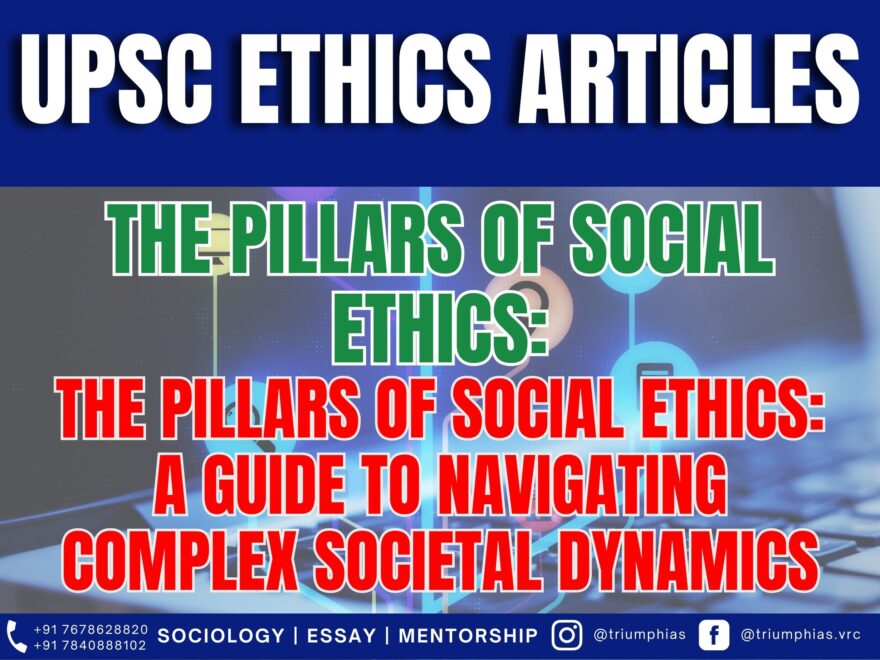Social Ethics
(Relevant for Ethics, Integrity and Aptitude)

Social Ethics
Social ethics is a specialized domain within ethics that primarily delves into the ethical underpinnings, dimensions, and outcomes of collective choices, attitudes, and actions. Its focus is social in nature, as it centers on decisions and deeds that are communal in nature, rather than individual and personal. Moreover, it is preoccupied with values that are collectively defined and achieved. In essence, social ethics encapsulates the cumulative wisdom derived from the experiences of various people and cultures.
Communitarianism, a philosophical perspective rooted in Aristotelian and Hegelian thought, places emphasis on the necessity to strike a balance between individual rights and the welfare of the entire community. This philosophy counters liberalism’s portrayal of the independent, self-interested individual by presenting the individual as a social entity molded by their community’s values and culture.
Communitarianism often functions as a “code of behavior” that governs what is deemed acceptable or unacceptable. Additionally, it furnishes a framework to ensure the well-being of all community members. Unlike typical ethical norms, which are often driven by individual moral compasses that determine right and wrong, societal ethics tend to focus more on determining appropriate behavior for the broader population. Nevertheless, diverse perceptions exist, and various cultures may harbor significantly contrasting beliefs. Consequently, what is regarded as “right” for one group might not universally apply. Establishing social ethics as an absolute standard often proves to be quite challenging.
Key Aspects of Social Ethics:
Social ethics encompass various dimensions that shape the moral fabric of society. Some key aspects include:
Human Dignity: Acknowledging the intrinsic value of every person, irrespective of their origins, race, gender, or societal position. This principle entails treating others with consideration, equity, and understanding.
- Justice and Equitability: Ensuring equal chances, access to resources, and impartial treatment for all segments of society. Social ethics necessitate addressing disparities and biases while advancing both social and economic fairness.
- Respect for Autonomy: Recognizing and respecting individuals’ entitlement to make choices and decisions in line with their own convictions and values. This encompasses informed consent, privacy, and the liberty to express oneself without apprehension of repercussions.
- Beneficence: Engaging in actions that enhance the welfare and well-being of others. Social ethics compel individuals to weigh the repercussions of their conduct and actively contribute to the amelioration of society.
- Social Responsibility: Grasping the interconnectedness of individuals and communities and acknowledging the significance of collective endeavors to tackle societal concerns. This entails proactive involvement in initiatives aimed at advancing communal welfare and sustainability.
- Integrity and Truthfulness: Upholding moral and ethical standards, while upholding honesty and transparency in personal and professional interactions. Social ethics mandate a sense of responsibility and ethical behavior in all facets of life.
Social ethics lay the groundwork for an equitable and all-encompassing society. They offer a framework that guides individuals and communities through intricate societal challenges, aiding them in making decisions that prioritize the well-being of the collective. Several significant reasons underscore the importance of social ethics:
- Cultivating Social Concord: Social ethics cultivate empathy, understanding, and regard among individuals and various groups, ultimately fostering peaceful cohabitation and harmonious relations within society.
- Safeguarding Human Rights: Social ethics play a pivotal role in safeguarding essential human rights and upholding human dignity, thereby thwarting instances of discrimination, exploitation, and injustice.
- Nurturing Trust and Collaboration: Upholding ethical values within social ethics stimulates the growth of trust, cooperation, and collaborative efforts among individuals, institutions, and communities.
- Empowering Social Advancement: By addressing societal concerns and endorsing ethical conduct, social ethics contribute significantly to the overall advancement and progress of society, thus laying the foundation for an improved future for all.
To conclude, social ethics act as a moral guide for both individuals and communities, aiding them in manoeuvring through intricate social dynamics while prioritizing the welfare of every member within society. Grasping and embracing the principles of social ethics holds vital importance in cultivating a society that is fair, all-encompassing, and marked by harmony.
Sample Question for UPSC Sociology Optional Paper:
Question 1: How does communitarianism influence the framework of social ethics?
Answer:
Communitarianism emphasizes the balance between individual rights and communal welfare, serving as a foundational philosophy in shaping social ethics which are collective in nature.
Question 2: What is the significance of the principle of ‘Human Dignity’ in social ethics?
Answer:
The principle of ‘Human Dignity’ acknowledges the intrinsic worth of each individual, calling for equitable and respectful treatment regardless of societal position, race, or gender.
Question 3: How do social ethics contribute to safeguarding human rights?
Answer:
Social ethics play a crucial role in protecting human rights by promoting principles like justice, equitability, and human dignity, thereby preventing instances of discrimination and exploitation.
Question 4: How is the concept of ‘Social Responsibility’ articulated within social ethics?
Answer:
‘Social Responsibility’ in social ethics involves recognizing the interconnectedness of individuals and communities and calls for collective efforts in addressing societal concerns for the welfare of all.
Question 5: What role does ‘Integrity and Truthfulness’ play in the domain of social ethics?
Answer:
‘Integrity and Truthfulness’ serve as pillars in social ethics, mandating honest and transparent behavior in both personal and professional interactions, thereby fostering trust and collaboration within society.
To master these intricacies and fare well in the Sociology Optional Syllabus, aspiring sociologists might benefit from guidance by the Best Sociology Optional Teacher and participation in the Best Sociology Optional Coaching. These avenues provide comprehensive assistance, ensuring a solid understanding of sociology’s diverse methodologies and techniques.
Best Sociology Optional Teacher, Best Sociology Optional Coaching, Sociology Optional Syllabus, Social Ethics, Communitarianism, Human Dignity, Justice, Equitability, Respect for Autonomy, Beneficence, Social Responsibility, Integrity, Truthfulness, Human Rights, Social Advancement

Choose The Best Sociology Optional Teacher for IAS Preparation?
At the beginning of the journey for Civil Services Examination preparation, many students face a pivotal decision – selecting their optional subject. Questions such as “which optional subject is the best?” and “which optional subject is the most scoring?” frequently come to mind. Choosing the right optional subject, like choosing the best sociology optional teacher, is a subjective yet vital step that requires a thoughtful decision based on facts. A misstep in this crucial decision can indeed prove disastrous.
Ever since the exam pattern was revamped in 2013, the UPSC has eliminated the need for a second optional subject. Now, candidates have to choose only one optional subject for the UPSC Mains, which has two papers of 250 marks each. One of the compelling choices for many has been the sociology optional. However, it’s strongly advised to decide on your optional subject for mains well ahead of time to get sufficient time to complete the syllabus. After all, most students score similarly in General Studies Papers; it’s the score in the optional subject & essay that contributes significantly to the final selection.
“A sound strategy does not rely solely on the popular
Opinion of toppers or famous YouTubers cum teachers.”
It requires understanding one’s ability, interest, and the relevance of the subject, not just for the exam but also for life in general. Hence, when selecting the best sociology teacher, one must consider the usefulness of sociology optional coaching in General Studies, Essay, and Personality Test.
The choice of the optional subject should be based on objective criteria, such as the nature, scope, and size of the syllabus, uniformity and stability in the question pattern, relevance of the syllabic content in daily life in society, and the availability of study material and guidance. For example, choosing the best sociology optional coaching can ensure access to top-quality study materials and experienced teachers. Always remember, the approach of the UPSC optional subject differs from your academic studies of subjects. Therefore, before settling for sociology optional, you need to analyze the syllabus, previous years’ pattern, subject requirements (be it ideal, visionary, numerical, conceptual theoretical), and your comfort level with the subject.
This decision marks a critical point in your UPSC – CSE journey, potentially determining your success in a career in IAS/Civil Services. Therefore, it’s crucial to choose wisely, whether it’s the optional subject or the best sociology optional teacher. Always base your decision on accurate facts, and never let your emotional biases guide your choices. After all, the search for the best sociology optional coaching is about finding the perfect fit for your unique academic needs and aspirations.
To master these intricacies and fare well in the Sociology Optional Syllabus, aspiring sociologists might benefit from guidance by the Best Sociology Optional Teacher and participation in the Best Sociology Optional Coaching. These avenues provide comprehensive assistance, ensuring a solid understanding of sociology’s diverse methodologies and techniques. Sociology, Social theory, Best Sociology Optional Teacher, Best Sociology Optional Coaching, Sociology Optional Syllabus.
Best Sociology Optional Teacher, Sociology Syllabus, Sociology Optional, Sociology Optional Coaching, Best Sociology Optional Coaching, Best Sociology Teacher, Sociology Course, Sociology Teacher, Sociology Foundation, Sociology Foundation Course, Sociology Optional UPSC, Sociology for IAS,
Follow us :


https://t.me/VikashRanjanSociology
Find More Blogs
|
Scope of the subject and comparison with other social sciences |
|||
|
|
|
|
Modernity and social changes in Europe |


One comment